

New Yorkers Rediscover Activism in the Trump Presidency Era. Violence flares in Washington during Trump inauguration. By Jonathan Landay and Scott Malone WASHINGTON (Reuters) - America's political divisions turned violent on Washington's streets during U.S.
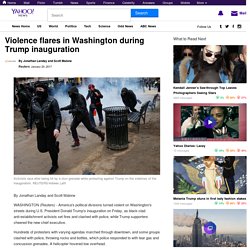
President Donald Trump's inauguration on Friday, as black-clad anti-establishment activists set fires and clashed with police, while Trump supporters cheered the new chief executive. Hundreds of protesters with varying agendas marched through downtown, and some groups clashed with police, throwing rocks and bottles, which police responded to with tear gas and concussion grenades. A helicopter hovered low overhead. At one flash point, a protester hurled an object through the passenger window of a police van, which sped away in reverse as demonstrators cheered.
Multiple vehicles were set on fire, including a black limousine and a television truck. Police said at least 217 people were arrested and six officers were injured in scuffles with activists. Democratic officials, including Washington Mayor Muriel Bowser, condemned the violence. The U.S. 2017 Cabinet Nominees.
Anti-Trump Protest Washington DC 11/12/16. Hate crimes, racist graffiti after election; Trump says 'stop it' "They've been everywhere -- in schools, in places of business like Walmart, on the street," SPLC President Richard Cohen said.
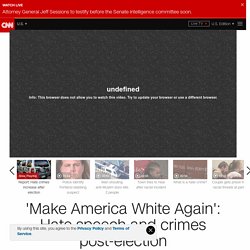
Critics accused Trump of fostering xenophobia and Islamophobia during the divisive presidential campaign. Recent days have witnessed ugly episodes of racist or anti-Semitic, pro-Trump graffiti along with threats or attacks against Muslims. The President-elect said he was "so saddened" to hear about vitriol hurled by some of his supporters against minorities. "If it helps, I will say this, and I will say right to the cameras: Stop it," Trump told CBS' "60 Minutes.
" Not all incidents are spurred by Trump supporters. The election-related incidents follow a year of heightened attacks against Muslim Americans. Overall, reported hate crimes spiked 6%, but the number could be higher because many incidents go unreported, Lynch said. Here's what some Americans are dealing with across the country: Mosques get letters calling for genocide 'Go home' scrawled on car New York Gov. How to Make Sense of 2016. FOR a certain kind of liberal, 2016 stands as a rebuke.
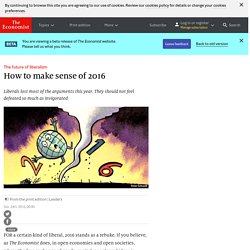
If you believe, as The Economist does, in open economies and open societies, where the free exchange of goods, capital, people and ideas is encouraged and where universal freedoms are protected from state abuse by the rule of law, then this has been a year of setbacks. Not just over Brexit and the election of Donald Trump, but also the tragedy of Syria, abandoned to its suffering, and widespread support—in Hungary, Poland and beyond—for “illiberal democracy”. As globalisation has become a slur, nationalism, and even authoritarianism, have flourished. In Turkey relief at the failure of a coup was overtaken by savage (and popular) reprisals. In the Philippines voters chose a president who not only deployed death squads but bragged about pulling the trigger.
Faced with this litany, many liberals (of the free-market sort) have lost their nerve. Trump's First 100 Days: Here Is What The President-Elect Wants To Do. President-elect Donald Trump meets supporters after his acceptance speech at the New York Hilton Midtown.
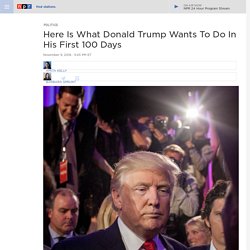
Natalie Keyssar for NPR hide caption toggle caption. 10 Days After: Harassment and Intimidation in the Aftermath of the Election. Thousands of Anti-Trump Protestors Shut Down I-94 in Minneapolis. America now shunning news media after 2016 election. Inaccuracies, melodrama, bias, outrage: Journalists showcased plenty during election night news coverage which proved to be intense — and endless.
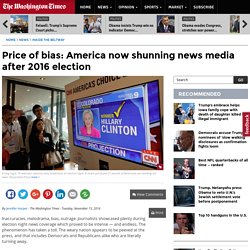
The phenomenon has taken a toll. The weary nation appears to be peeved at the press, and that includes Democrats and Republicans alike who are literally turning away. “As America deals with the fallout of the election, 27 percent of the country is actively trying to avoid the news. Democrats (36 percent) are the most likely to be making an effort to avert their gaze from newspapers and television news, but the divide is not as significant as one might expect. 21 percent of Republicans are also trying to avoid the news,” writes Peter Moore, an analyst for YouGov, which polled a thousand Americans on the subject.
“Very few — 11 percent — say that reading or watching the news has put them in a good mood in recent days,” he adds, noting that 3 percent of the Democrats and 26 percent of Republicans agree. “That didn’t happen.